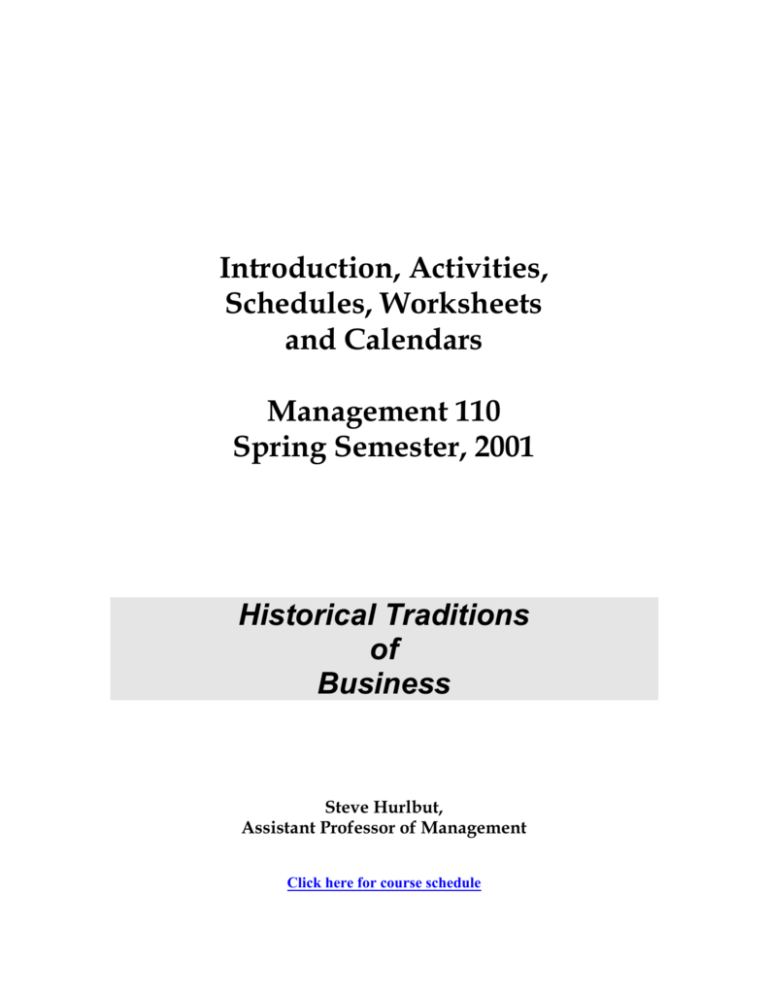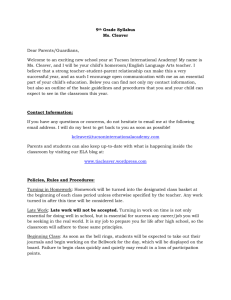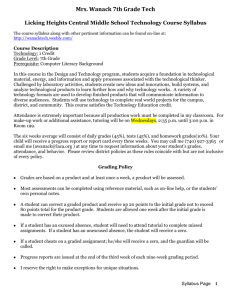Introduction, Activities
advertisement

Introduction, Activities, Schedules, Worksheets and Calendars Management 110 Spring Semester, 2001 Historical Traditions of Business Steve Hurlbut, Assistant Professor of Management Click here for course schedule Fall 2000 Management 110 Course Introduction and Philosophy Instructor: Steve Hurlbut, Telephone: (801) 832-2618 (office) E-mail: Office: Office Hours: s-hurlbu@wcslc.edu Gore 111 Tues.-Thurs. ~ 1:00 PM – 4:00 PM Wed. ~ 4:00 PM – 7:00 PM (or by appt., or after class) Text: No text, but you must subscribe to Business Week for the semester This class is an introduction to the study of Business at Westminster College. The class is designed to emphasize the relationship between business and society, and the evolution of this relationship over time and in different cultures. The class is also designed to introduce students to the Gore School of Business Student Outcomes. This is a list of skills all students should have before they graduate from Westminster College with a degree in Business. This class is an introductory class. If you have had more than two college-level business courses, please see me immediately. I may waive this class for you. Most students will find this to be a very different class from other business classes they have taken. We will not introduce or study the fundamental skills of business (Accounting, Marketing, etc.) in any organized fashion: you will have more than enough opportunities to do that before you graduate. This class will emphasize that business practices do not just appear- they evolve over time, in response to the general conditions in society. It is important that students understand this process, because society will undergo many major changes in the next 50 years, and Westminster College cannot predict what these changes will be. We can only prepare our students to identify the conditions that will cause changes in the way business will be conducted, and to adapt to those changes. The class is student centered-there are very few lectures, and much of the material is presented by students. There are several team projects, and several student presentations. There are a relatively large number of assignments. Attendance is critical, and you should review the attendance policy at the end of the syllabus. If you foresee any problems, due to work schedule, travel plans, etc., please see me. Through explorations of disparate world (Europe, Africa, South America, Far East, and the United States) historical events, you will be guided into developing a view as to how and why traditional historical traditions of business have developed. A model, STE4P , will be used to develop analytical skills that will give structure not only to this course but will also provide a foundation for further Gore School of Business courses (see the attached Business Skills Chart). You will be expected to develop an appreciation and understanding of the historical origins of modern business practices (e.g., accounting, marketing, finance) and how they apply to the modern world. STE4P is a pedagogical (teaching/learning) device used to focus and direct one’s attention to features of a given context. It is an analytical tool by which one can sort, categorize, and manage a context that may Fall 2000 Management 110 seem initially to have little structure or coherence. The components are (a guide and worksheets will be supplied): 1. 2. 3. S T E1 4. 2 E 3 E 4 E P = = Social conditions Technological status = Ethics and philosophy = Economics = = = Entrepreneurial view Environment Politics Fall 2000 Management 110 Course Activities and Requirements (Not necessarily in priority order) There are a number of activities in this course. Do not be taken back by either the number or what seems, initially, the complexity of the tasks. They are all easily doable and you should have no trouble at all getting into the “swing” of things after just a couple of weeks. No single activity counts for a major portion of your grade, i.e., good news - there will be no necessity of cramming for a test. You will, however, need to keep up with the work in a weekly fashion. Getting behind is both inadvisable and could be unpleasant: A word to the wise is sufficient!! Be aware that this class is, generally, not a lecture-driven class. The pedagogy is structured in such a way that you are responsible for much (most!) of the learning. The instructor’s role is one of experienced guide and facilitator. Therefore, there will be a fair amount of classroom discussion. As you will see, your grade will include a class participation component. Each activity has associated with it a number skills. The “skills block” gives the major skills for the activity. The complete skills list and explanation is attached to this syllabus. Skills Activity #1 Historical Events Selection A,C,D,F,H,I The business world has never been limited to American enterprise and yet, due to the size of the American economy and its present impact on world economies, one may think of “business” as a reasonably recent American phenomenon. You will be asked to “step” into an expanded business world that covers the entire globe. We will select one item from three of the five geographical areas and the range of events below to explore in more detail. The STE4P model, to be explained in more detail during the first few class periods, will be used to give structure to your explorations. 1. Africa (north and south) • Slave trade - External/Internal and Today • Mali, Benin, and Zimbabwean Empires • Pyramid Construction • Modern (European) expansion into Africa • Ancient (Roman) expansion into Africa 2. The Far East (Japan, China, India, etc.) • The Opium War Period • The Shogun Period in Japan (1600-1850) • History of Hong Kong Trade • The Ming Dynasty Fall 2000 Management 110 3. Europe • Trade Routes to the East (Marco Polo et al) • The Crusades • The Fall of the Roman Empire • The Rise of Italian City-States (1500s) • The Napoleonic Expansion • The Viking Expansion 4. The United States • The Civil War - Agriculture and Industry • The Westward Expansion - Railroads and Telegraphs • The 30s - New Deal, Depression, etc. • Henry Ford, Industry, and Assembly Lines • American Indians: Tribes, Territories, and Trade 5. South America • Spanish Conquest of the Incas and Mayans • Mayan Trade - Pyramids, roads, and trade • South American Oil • Bananas and Rubber: The Plantations Class members will form teams to present to rest of the class one or more of the STEP factors to the rest of the class. Skills Activity #2 C,F,H Movies Pick any two (2) of the following movies, which are readily available from rental stores, view them, and report on them. I have included movie review guidelines in this syllabus. The point of this exercise is to increase your awareness of business (esp. business ethics) outside the classroom in venues, which may be somewhat outside your normal range of experience. You, generally, should NOT see a movie that you have previously viewed. See something new to you!! Broaden your horizons. List of Movies (Pick any two - you may substitute a movie of your choosing with my approval - I will be adding to this list as the course progresses) Schlinder’s List Class Action Koyaanisqatsi The Fountainhead White Man’s Burden Philadelphia WallStreet The Doctor Quiz Show Norma Rae MindWalk Disclosure Rob Roy Matewan Extreme Measures Fall 2000 Management 110 Erin Brockovich People vs. L. Flynt The Insider Barbarians at the Gate The Big One The Boiler Room Glengarry Glen Ross In the Company of Men Roger and Me Movies to be Watched in Class (provided by instructor - time permitting) These movies, time permitting, will be watched in class. Tucker: The Man and His Dream Other People’s Money Skills Activity #3 C,D,F Bluebook Journal I will give every class member a Bluebook during week #2 of the class, and I will give instructions throughout the course about what I want you to reflect upon in the journal. There will be approximately 4-6 reflections I will ask for at various times during the semester, and I will collect the journal near the end of the course. The journal will be graded on a pass-fail basis. Either you will get all the possible points, or none. Almost everyone will probably get all the points for this assignment. Skills Activity #4 A,C,D.F,H Book Report You are to read and complete at least one business book report to be taken from one of the following categories: (book report forms are supplied) 1. 2. 3. 4. 5. A Great Man Report Great Era/Event/Period Report Classic Business Books Current Business Best-Sellers Miscellaneous Books I have included book review guidelines in this syllabus. Listed in this syllabus are representative samples of the types of books I have in mind. You may feel free to substitute a book of your choice with my approval Fall 2000 Management 110 -- NO EXCEPTIONS. Additionally, you should be prepared to share your report with your classmates via a brief (10 minutes) oral presentation. Activity #5 Skills A,B,C,F Case Study W.L. Gore and Associates We will use W.L. Gore and Associates to learn the Case Study method of learning, and to study in more detail how several of the topics we will be covering in this course apply to an individual company. You will work in groups on this assignment, and submit a paper in standard case study format. Skills Activity #6 A,B,C,D,E,G,I Entrepreneurial Business Startup Entrepreneurial skills (--assuming the risks for operating a business) are a necessity whether you intend to start your a business or work within a large corporation. In this activity you will be asked to write a very simple business plan for the startup of a company of your own creation. This will include such items as: • Management Background • Organizational Structure • Production Requirements • Marketing Plan • Financial Projections • Etc. I will have prepared for you a sample plan complete with sample financial projections for you to follow and a handout giving more specific requirements. This is a group project, and you will complete a written report, and an oral presentation to the rest of the class. Skills Activity #7 C,D,F,H Current Business Week Discussion Although much of this course is concerned with the “historical” traditions and origins of business practices, such an exploration would not be fruitful if it were not linked to current, modern business practices. Each week we will spend a portion of a class period discussing current business events/stories/news that appear in the current copy of Business Week Magazine. You will need to read (or at least peruse) this magazine each week and I have student subscription forms--you will need to have your own copy available for the classroom discussion. Where possible, you should try to make links with the historical events/concepts that we have been discussing. This is a good forum for you to ask anything you want about finance, marketing, accounting, IPOs, LBOs, REITs, etc. Fall 2000 Management 110 It is the instructor’s firm belief that regular reading of the current business press results in much more informed and competent students. I want you to get in the habit of doing this now. In order to emphasize the importance of this, there will be short essay quizzes throughout the semester on articles in Business Week. Activity #8 Skills Classroom Participation A,B,D,G As mentioned previously, there will be a fair amount of classroom discussion and you are expected to be an active participant. A significant portion (10%) of your grade is dependent upon your being prepared for each class and contributing to the discussion. Activity #9 Skills Final Examination C,D,F,H The final examination will be cumulative, essay, comprehensive, and take home. It will consist of approximately 3 - 6 essay type questions that will be given to you approximately one week before the scheduled final examination period. You will be asked to select three of the questions and answer them in not more than two typed written pages each. The questions will be quite broad in nature and your answers should give evidence of the breadth of knowledge that you have garnered this semester. *ATTENDANCE REQUIREMENTS * It is assumed that since you are attending college it must be very important to you. Accordingly, attendance is required for ALL of the classes. Attendance does not count for you; however, lack of attendance will count against you. There are approximately 28 scheduled class periods. It is reasonable to expect that as adults things do happen (e.g., sick children, ailing parents, weddings, funerals, accidents, etc.) that may necessitate that you may miss a class. However, since much of this class is predicated upon class participation, your absences will not be excused. If you miss fewer than 10% (1, 2, or 3) of the scheduled classes your grade will not be effected. If you miss more than 10% (4 classes or more) of the scheduled classes your grade will be lowered by 2.5% for each absence. For example, if you are absent 4 times, your grade will be lowered by 10% (2.5% * 4.0 absences). If you were absent, say, 6 times your grade will be lowered by 15% (2.5% * 6.0 absences). Fall 2000 Management 110 If you miss more than 20% (approximately 6 classes) of the scheduled classes, your chances of making an acceptable grade in this class are doubtful. I have regular office hours and will be glad to meet with you concerning these issues. It is much better to discuss things with me before the fact!! Fall 2000 Management 110 Activity and Assignment Grading Activity Weighting (%) 1. Historical Events 10% 2. Movies 10% 3. Bluebook Diaries 5% 4. Book Report 5% 5. Case Study 10% 6. Entrepreneurial Business Startup Plan 20% 7. Business Week quizzes 20% 8. Class Participation 5% 9. Final Examination 10% TOTAL 100% Fall 2000 Management 110 Guide to Gore School of Business Skill Outcomes A Skill Title Finding Information Skill Description Research using the library, CD roms, and the Internet B Quantitative Analysis Numerical and graphical literacy C Communication Writing, presenting analysis, presenting arguments, organizing, summarizing, and oral presentation D Critical Thinking Concept integration and synthesizing E Entrepreneurial Skills Flexibility, adaptability, and leadership F Systems Awareness Cultural and legal literacy, social and organizational systems G Technological Integration Computer literacy H Action Awareness Ethical concepts and awareness I Interpersonal/Team Skills Team building skills Note: This is the basic structure of the skills. A capital letter (“A”) is used to denote applying the skill, while a small letter (“a”) is used to denote introduction of the skill. Fall 2000 Management 110 REPRESENTATIVE TYPES OF BOOKS I HAVE IN MIND FOR THE BOOK REPORT You MUST obtain prior approval before reading any book not on this list. Ask First!! CURRENT BUSINESS TOPICS/BESTSELLERS Ben & Jerry’s double-dip: Lead with your values and make money, too by Ben R. Cohen AOL.COM: How Steve Case beat Bill Gates, nailed the netheads, and made millions in the war for the Web by Kara Swisher Bloomberg by Bloomberg The Millionaire Next Door by Thomas Stanley A Civil Action by Jonathan Harr About W. R. Grace, Beatrice Foods and lots of locals with leukemia. A long legal battle ensues and the lawyer who fought for the little guys has a long uphill battle. Robert Redford owns the movie rights Informed Consent by John A. Byrne A story about the silicone breast implant crisis. The story of Dow Corning’s corporate ethics officer and his own wife’s medical struggle. An insiders’s view. Downsize This! by Michael Moore So you work incredibly hard and your other half also works and you feel like you're going to thrombose when the TV commercials talk about your retirement fund because you don't even have a savings account, and you're terrified all day every day that the next time they play vocational spin the bottle, you'll be the one who gets the kiss that sends you out of the game and onto....oh, that's right, we don't have welfare- as-weknew-it anymore. Well, Michael Moore --- the director of the funny, biting, sort-of-documentary, "Roger & Me" --- is just as angry. And maybe a little funnier. GREAT OR AT LEAST INTERESTING BOOKS RE: BUSINESS PERSONALITIES The HP Way: How Bill Hewlett and I Built Our Company by David Packard The Life and Legend of Jay Gould by Maury Klein Entrepreneurs: The Men and Women Behind Famous Brand Names and How they Made it by Joseph J. Fucini Trump: The Art of the Deal by Donald Trump Sam Walton, Made in America by Sam Walton Barbarians at the Gate: The Fall of RJR Nabisco by Bryan Burrough and John Helyar Profiles of Genius: Thirteen Creative Men Who Changes the World by Gene N. Landrum Iacocca: An Autobiography by Lee A. Iococca In Search of L. L. Bean by M. R. Montgomery The Hogles (i.e., Hogle Zoo family) by Gerald M. McDonough Fall 2000 Management 110 Titan: The life of John D. Rockefeller, Sr. by Ron Chernow GREAT ERA/EVENT/PERIOD/CONCEPT BOOKS An Economic Interpretation of the Constitution The Great Crash, 1929 by John Kenneth Galbraith The Affluent Society by John Kenneth Galbraith China’s New Business Elite: The Political Consequences of Economic Reform by Margaret M. Pearson The African Entrepreneur: A Study of Entrepreneurship and Development in Kenya by Peter Marris Toy Wars: The Epic Struggle Between G. I. Joe, Barbie, and the Companies that Make Them by G. Wayne Miller The Robber Barons by Matthew Josephson Class Struggle Is the Name of the Game: True Confessions of a Marxist Businessman by Ollman Bertell Mennonite Entrepreneurs by Calvin Wall Redekop CLASSIC BUSINESS BOOKS The Prince by Machiavelli The Wealth of Nations: An Inquiry into the Nature and Causes of by Adam Smith The Death of a Salesman by Arthur Miller Capitalism and Freedom by Milton Friedman Main Street by Sinclair Lewis Babbitt by Sinclair Lewis The Jungle by Upton Sinclair Heart of Darkness by Joseph Conrad The Fountainhead by Ayn Rand MISCELLANEOUS BUSINESS BOOKS Unsafe at Any Speed: The Designed-In Dangers of the American Automobile by Ralph Nader Jesus, CEO: Using Ancient Wisdom for Visionary Leadership by Laurie Beth Jones Liar’s Poker by Michael Lewis The story of a rising bond trader during the 80s at Solomon Brothers. A really nasty look at what goes on behind the scenes. From a beginner, “Geek”, to a “Big Swinging Dick” (his words) An easy read and fun! Fall 2000 Management 110 Post Capitalist Society by Peter F. Drucker Megastates, global corporations, “knowledge” workers are just some of the topics in management guru Drucker’s new book about current business and society trends. The Culture of Contentment by John Kenneth Galbraith Galbraith analyzes the by-products of America’s complacency: a commitment to short-term action, government seen only as a burden, etc. Galbraith, of course, is retired from Harvard. The Future of Capitalism by Lester Thurow With all the layoffs and the increase in corporate efficiency, could capitalism run out of customers able to buy its products? Might capitalism self-destruct? Thurow is a MIT economist. A relatively easy” read. The End of Work: The Decline of the. . Work by Jeremy Rifkin Will technology and the ever increasing striving for efficiency displace so many workers that capitalism does not have enough customers for its goods and services? A light easy style and provocative. Beyond Beef: Rise and Fall of the Cattle Culture by Jeremy Rifkin The Money Game Super Money Paper Money The Roaring 80’s George J.W. Goodman, writing under the name of “Adam Smith”, writes all of the above books. He chose this name as a tribute to the original Adam Smith; please do not confuse the two. God Bless You, Mr. Rosewater by Kurt Vonnegut, Jr. A humorous novel, in which the major characters all struggle to make sense out of the role of money in society. Jailbird by Kurt Vonnegut, Jr. A novel, in which the fictional protagonist gets a bird’s-eye-view of the Depression, the New Deal, Watergate, and a secretive conglomerate determined to own the entire country.







